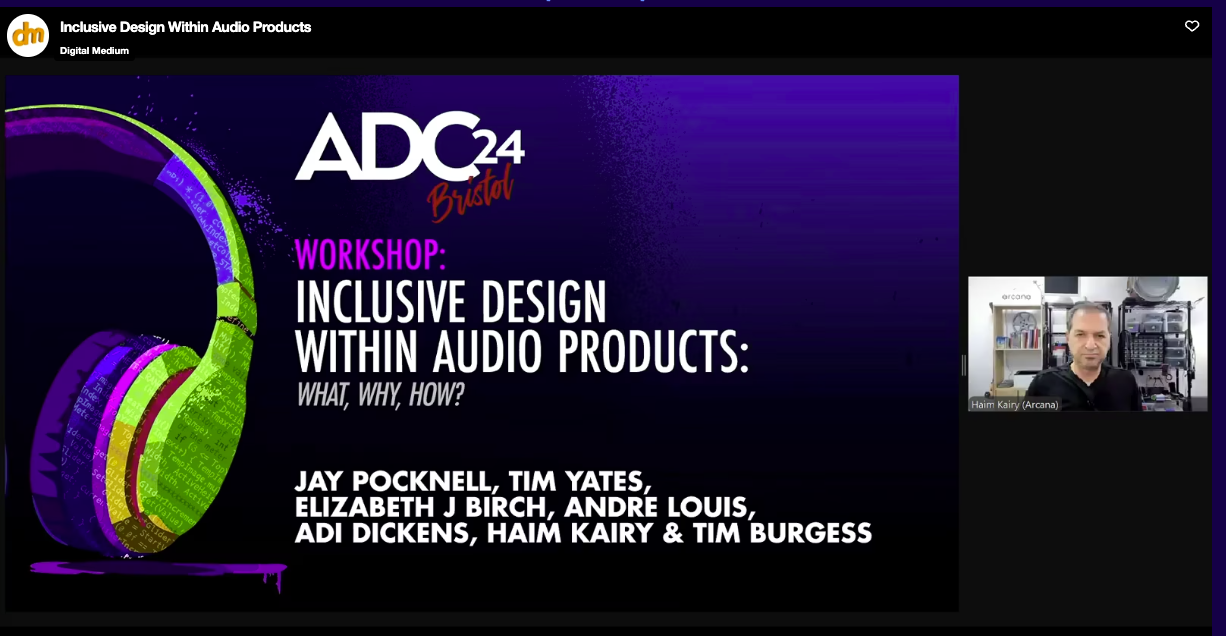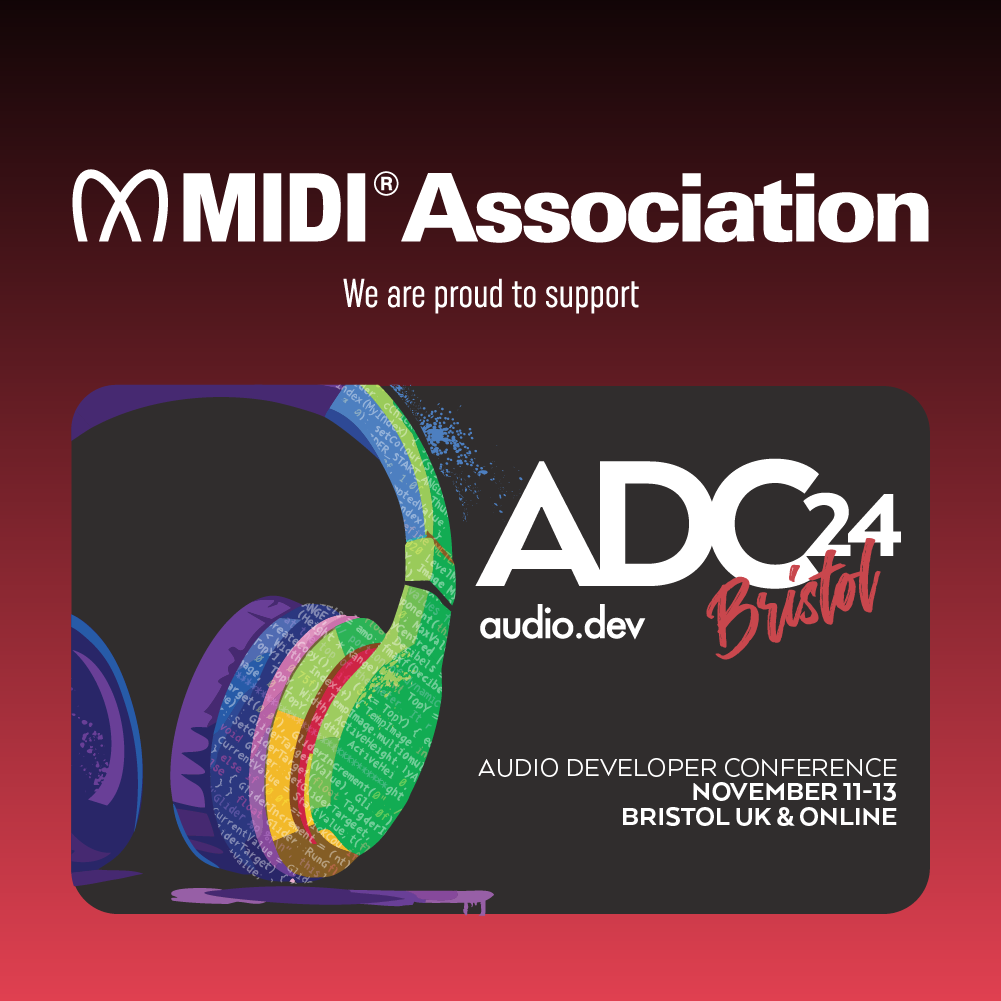Audio Developers Conference 2024


Audio Developers Conference
Tickets to ADC24
Tickets to ADC24 are available for both in person and virtual attendance and range in price with discounts for Academics and Students. Click the button below to see all the options.
MIDI Association Companies Sponsor The Audio Developers Conference 2024
For many years now The MIDI Association has been a community sponsor of the Audio Developers Conference.
At ADC24, MIDI Association members Juce and Focusrite are Gold Sponsors of the conference. Arturia, Avid, Muse Group and Roland are Silver Sponsors and Steinberg is a Bronze sponsor.





MIDI Association Companies Presentations At Audio Developers Conference
MIDI Association companies are giving a number of presentations at ADC24.
The MIDI Association is actually underwriting support for the Workshop: Inclusive Design within Audio Products.
This workshop which is being run by Jay Pocknell of the Royal Institute for the Blind highlights the work being done to make music music more accessible to everyone and features the work of many of the people in the MIDI Association’s Music Accessibility Standard Special Interest Group.
Workshop: Inclusive Design within Audio Products
What, Why, How?
14:00 – 17:00 UTC | Monday 11th November 2024 | Empire
Following the success of last year’s ‘An Introduction to Inclusive Design of Audio Products’, we are delighted to be presenting a follow up this year. The session will promote the work happening across the audio industry to support accessibility and inclusive design. We will focus on providing practical design principles for attendees to take away, backed up by engaging lived experience insights and demonstrations.
In particular, we will showcase the practices of two companies who have been making big waves within accessible music in the last year: Ableton and Arcana Instruments. Jay Pocknell and Tim Yates will be exploring how these companies involved the disabled musician community throughout the design of their products, as well as sharing accessibility top tips for attendees to take away, along with insights from musicians Elizabeth J. Birch and Andre Louis.
Why is this important?
As the audio industry seeks to improve diversity within its workforce, and the music industry seeks to widen the diversity of artists creating music, it is essential that inclusion becomes woven into the design of the tools available.
Panellists
- Chair – Jay Pocknell (RNIB / Sound Without Sight)
- Tim Yates (Drake Music)
- Elizabeth J. Birch (Musician / Accessibility Consultant)
- Andre Louis (Musician / Accessibility Consultant)
- Adi Dickens (Ableton)
- Haim Kairy (Arcana)
Outline
- Introductions from all panellists. 10 mins.
- Overview of the social model of disability. 10 mins.
- Why design inclusively? The importance of accessibility in mainstream audio technology. 10 mins.
- Inclusive design principles and best practice guidelines for music-making and audio products, including examples from products already on the market. 40 mins.
[Break. 10 mins.]
Call to action. How to learn more, further resources to explore. 5 mins.
Case study – Developing with the community: what Ableton have learnt since investing in accessibility and connecting with their user community during the development of Live 12, Note, and Move. Andre Louis will also demonstrate the accessibility features of Ableton Move. 30 mins.
Case study – From the ground up: how Arcana built a company around inclusive design and developed their first instrument, the Arcana Strum, for all. 30 mins.
Panel Q&A. All panellists. 30 mins.
Beyond ValueTrees
(Confessions of a ValueTree Skeptic)
15:40 – 16:00 UTC | Monday 11th November 2024 | Bristol 2
Presenter: Brett g Porter Lead Software Engineer Artiphon and Executive Board of The MIDI Association
The JUCE website says “The ValueTree class is JUCE’s secret weapon,” and it’s true. They give you:
- A really easy way to capture and pass around the entire state of your application’s data at run time
- A rich mechanism to watch that data at a fine degree of granularity
- Trivially easy persistence of application state
…but at the cost (in comparison to using native POD or class/struct variables) of being:
- slower
- less convenient to use
- less type-safe, since all values are stored in the JUCE var variant type.
This talk will explore the new Cello library to abstract away the underlying API calls in favor of syntax that’s more like working with POD data. The original goal was to be able to write code something like the below, but using ValueTrees as the backing data store:
Roland’s Holistic Approach to AI for Music Creation
12:20 – 12:50 UTC | Tuesday 12th November 2024 | Bristol 3
Presenter: Paul McCabe SVP Research & Innovation Roland Future Design Lab
Presenter: Ichiro Yazawa Advanced R&D Group Leader Roland Future Design Lab
Presenter: Kazuyoshi Sasamori AI Product Manager Roland Future Design Lab
This presentation introduces Roland’s approach to AI for music creation and will include a technical demonstration of a new AI-powered application. Roland will also overview its holistic strategy for AI which considers R&D, policy, and governance mechanisms. As a general-purpose disruptive technology, Artificial Intelligence is in the process of impacting virtually every aspect of life, including creativity. As a leading music technology innovator, Roland is highly optimistic about the potential of AI to enhance and empower human music making but is deeply aware of the need to innovate responsibly.
Expanding SDKs and APIs in Pro Tools
12:20 – 12:50 UTC | Tuesday 12th November 2024 | Bristol 1
Dave Tyler Senior Manager, Development Partner Program Avid
In this session, we will discuss how SDKs will play an important part in the future of Pro Tools to enable the integration of partner technologies and workflow solutions.
Introducing ni-midi2
A Modern C++ Library Implementing MIDI2 UMP 1.1 and MIDI CI 1.2
14:00 – 14:50 UTC | Tuesday 12th November 2024 | Bristol 1
Franz Detro – Member of the MIDI Association Technical Standards Board and contributor to MIDI 2.0 and USB Audio/MIDI Device Class specifications. Co-founder of midi2.dev – a collaboration platform for MIDI 2.0 developer resources.
MIDI 2.0 implementations arrived in recent macOS and Linux versions, and Windows MIDI 2.0 support is expected to arrive end of 2024.
ni-midi2 is a modern C++ library implementing MIDI2 UMP 1.1 and MIDI-CI 1.2. The platform-independent library allows you to easily migrate your code to support MIDI 2, while maintaining compatibility to the traditional MIDI 1 protocol.
The talk will cover basic concepts of the library and real-world examples of how it helps you to achieve protocol-agnostic MIDI 2 support in your codebase.
Sponsor Talk from Focusrite
12:20 – 12:50 UTC | Wednesday 13th November 2024 | Bristol 2
TBD
Going Deeper with CLAP
12:20 – 12:50 UTC | Wednesday 13th November 2024 | Bristol 3
Alexandre Bique Software Developer Bitwig Urs Heckmann U-HE
Alexandre Bique of Bitwig and Urs Heckmann of u-he join the stage to present updates on CLAP (CLever Audio Plugin API). A lot has happened since CLAP was presented at ADC 23. Alexandre and Urs will briefly focus on industry adoption and give an overview of latest extensions, roadmap and goals. Then they’ll be digging deeper by showing example implementations of some of CLAPs core features, such as Polyphonic Parameter Modulation and Voice Info.
An Efficient, Open-Source C++ Loop Classifier and Tempo Estimator
The Algorithm Behind Audacity’s Brand New Tempo Detection Feature
15:00 – 15:50 Wednesday 13th November 2024 UTC
Matthieu Hodgkinson Senior Software Developer Muse Group
An efficient, offline C++ algorithm for loop classification and tempo estimation is presented, alongside its evaluation framework. The framework provides the area under the ROC curve (AUC) of the classifier, facilitating regression-free development and tuning of the algorithm. The AUC is now 0.93 when evaluated against the set of files (publicly available on freesound.org under the Creative Commons license) listed in the framework’s source code. By providing computation time measurement, the framework has also been useful for optimizing the algorithm, which is now typically over 2500 times faster than real-time (measurement made on a Windows laptop with a 12th Gen Intel Core i7-12800HX processor and 32 GB of RAM). Furthermore, the framework can be used to set the target false positive rate according to the requirements of your application. Algorithm and evaluation framework are open source, and care has been taken to keep the algorithm easily reusable.
The algorithm can be seen as a “classical” algorithm and reuses ideas described elsewhere in the literature. However, the idea behind the classifier is original. A set of loosely plausible numbers of tatums (or ticks) fitting in the duration of the provided audio file is taken. The likelihood of each tatum count hypothesis is evaluated by measuring the distance of each onset to its closest tatum and using the onset’s strength in the weighted average of all distances. The average is then compared to a threshold, and, if below, a disambiguation step is carried out, where the number of tatums is reused to determine the most likely tempo (BPM) and time signature.
As implied above, the input audio must be a loop for its tempo to be detected. This limitation was not deemed critical for the application the algorithm was intended for. On the other hand, it opened possibilities to improve the discriminant factor of the classifier, allowing a higher success rate while keeping the false positive rate low. This choice may explain the originality of the approach despite its simplicity.
As you can see the Audio Developers Conference and The MIDI Association have a close and copacetic relationship because many of our corporate members are supporters and sponsors of the Audio Developers Conference.
If you are at ADC24, please keep your eye out for these presentations and come up and say hello to the many MIDI Association members who will be there.